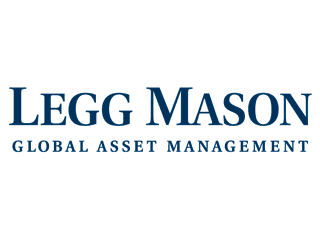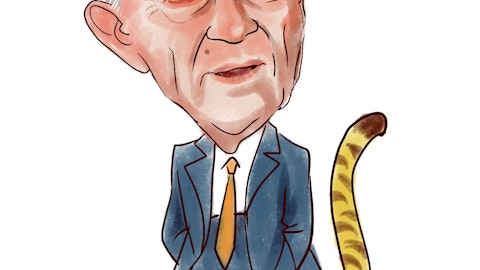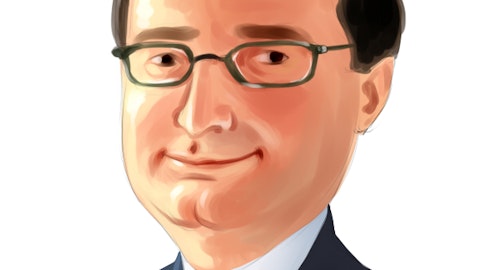After years of outflows from equity funds should investors finally invest in the asset managers as the money starts flowing back? One key to the equation is that most of the money flowed into bond funds that have low average fees placing an importance on finding the asset managers with the least exposure to bond funds. Or at least the ones that will see those funds rotate into equity funds.
According to TrimTabs, January had a record $77B flow into U.S.-listed equity funds (mutual funds and ETFs). While investors can debate whether these flows will continue, it is clearly worth reviewing the stocks that will benefit from a growth in equity investments that typically have higher fees than fixed income funds and especially money market funds. The real question is whether investors should move into fund managers or brokerage services. This article will focus on some of the leading asset managers.

Mega-cap international flavor
Franklin Resources, Inc. (NYSE:BEN) has long been a respected global investment manager. The company has a market cap of nearly $30B and forecasted 2013 revenue of nearly $8B. The stock trades at a reasonable forward PE of 12.5 and so far analysts have only increased earnings estimates around 1% in the last 90 days. Franklin has over $4B in net cash that the company can use to increase dividends with the comfort of a stronger end market.
The company reported AUM grew to $809.8B in January compared to $7818B at the end of December. It also reported assets had seen a strong increase of $105B or nearly 15% over last year with the vast majority of the gains in the last 6 months alone. The increases were led by global equity and taxable fixed income funds. The US fixed income funds actually managed to maintain balances during January.
Domestic fund giant
T. Rowe Price Group, Inc. (NASDAQ:TROW)
reported Q4 AUM that were up an average of 18% over last year. The total assets were $576.8B and increased over $86B from $489.5B last year. The majority of the assets are in T. Rowe Price mutual funds distributed in the United States. The company is a leader in retirement funds and has over $89B in target-date retirement funds.
Naturally any increase in funds flowing back into retirement accounts will benefit this stock. The company trades at over 17x forward earnings so the stock isn’t cheap after hitting multi-year highs. Analysts though haven’t upgraded earnings estimates after the record January fund flows due to the earnings miss in Q4.
Past equity leader
Legg Mason, Inc. (NYSE:LM) was long known as the home of legendary investor Bill Miller. The Legg Mason Value Trust fund he ran beat the market for 15 consecutive years until 2007. The global asset manager has never completely recovered from the recent underperformance of its leading stock fund.
The company reported AUM grew to $654.1B in January from $648.9B in December. Legg Mason actually reported less equity funds than back at the end of Q3. Combined with a sequential drop in fixed income funds, the fund flows are still suggesting the company is struggling to turn around. The liquidity group is seeing the bulk of new assets, but the total gains are sparse for now.
Potential comeback kid
Janus Capital Group Inc. (NYSE:JNS) was a poster child of the Internet bubble with its famous Janus Fund loaded up on technology stocks. The namesake fund has now dropped to $8B of assets, down from $50.9B in August 2000.
While the company hasn’t reported January fund flows, the recently reported Q4 was a major disappointment. Janus reported an amazing 14th quarter of negative fund flows. It is normally difficult for a global asset manager to regain momentum after such a lackluster performance. The stock is actually posting 52-week highs so investors will either have to play a breakout that is still considerably below the 2011 highs of nearly $14.
10-Year Total Return Chart
The shift to international and fixed income funds over the last 10 years benefited Franklin Resources and T. Rowe Price to a great degree. As the chart below shows, Janus and Legg Mason initially rebounded from the Internet bubble to only be crushed in the financial crisis:

BEN Total Return Price data by YCharts
Conclusion
Whether fair or not, investors have clearly been down on the two companies seen as controlled by equity funds with both Janus Capital and Legg Mason lagging the market rebound. While Ben Franklin and T. Rowe Price provide conservative plays into the sector, any investor really wanting to wager on a rebound in equity fund flows should look into the laggards. Can Legg Mason rebound with Bill Miller gone or will Janus be successful at launching several flavor of the year funds? Time will tell, but both stocks are worth researching for a rebound.
The article Should Investors Buy the Asset Managers on Rebounding Equity Flows? originally appeared on Fool.com and is written by Mark Holder.
Copyright © 1995 – 2013 The Motley Fool, LLC. All rights reserved. The Motley Fool has a disclosure policy.





